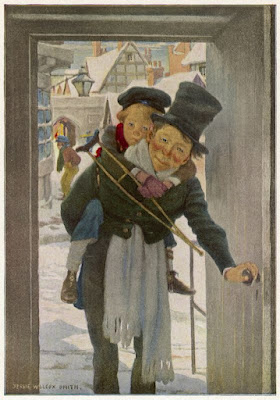Poor Tiny Tim.
I’m not saying that because he has a disability. I’m saying that because everyone, from his readers to his creator, pities him because he has a disability. He doesn’t pity himself, though! He joins in his siblings’ games whenever possible, and they cheerfully take him along with them. And while his father calls him “good as gold,” he’s not a perfect saint. When his father insists that the family drink a toast to his hard-hearted boss, Ebeneezer Scrooge, “Tiny Tim drank it last of all, but he didn’t care twopence for it.”
As someone who’s also familiar with braces and crutches, yes, the line “He told me, coming home, that he hoped the people saw him in the church, because he was a cripple...” makes me want to “spit nickels,” as my mom says. “The C-word” gets on my nerves, especially. But Dickens did one thing that I’ve appreciated more and more as I get older.
He tells us that Tim “Did NOT die.” He doesn’t say that Tim was cured. People often assume he was, but Dickens doesn’t say so.
It’s called “the Miracle Cure.” It’s so common I had a hard time coming up with examples where the protagonist isn’t rewarded for their bravery, virtue, etc. by being “made whole.”
Again and again, like some literary Jesus, authors make their lame characters walk and their blind characters see. It’s so pervasive I’ll bet most readers don’t even think about it, or if they do, simply nod. After all, how can the hero have a real Happily Ever After if they’re still “broken?”
Imagine what this says to a real-life kid who can never be “brave enough” or “good enough” to make their disability go away.
Sorry, kid. Glass slippers don’t come with orthotics. Castles have sweeping staircases, not wheelchair ramps. Wizards don’t write their spellbooks in Braille. People like us are only in books to be pitied, martyred, or cured.
Mostly.
In 1875, 32 years after A Christmas Carol, another book came out. The Little Lame Prince, by Miss Mulock, is about Prince Dolor, who, because of an injury as a baby, doesn’t walk, but gets around with “active froglike leaps.” When I read this, and saw the illustration of Prince Dolor with his atrophied legs, I shouted “He has CP like me!”
Now, this was the 1800s, so the C-word is still in there, but Miss Mulock gave kids like me a huge gift with her ending:
“Thus, though he never walked in processions, never reviewed his troops mounted on a magnificent charger, nor did any of the things which make a show monarch so much appreciated, he was able for all the duties and a great many of the pleasures of his rank.”
King Dolor is a real king. He works. He governs. People complain about him. He deals with it. And he lives about as happily ever after as anyone can expect to.
Books like this helped confirm that you can have a disability and still be a whole person. A writer, even! My characters have Cerebral Palsy, Acromegaly, paraplegia, quadriplegia, blindness, deafness, mental illnesses, Down Syndrome, and whatever else fits their character. Some things get cured, but not as a reward for virtue. Most don’t.
So will you join me? If you’re a writer, build your “castles in the air” with ramps and elevators. Readers, seek out books where the heroine packs her antidepressants along with her other quest supplies, and the Prince and Princess hand-sign “I do” before they kiss.
And we’ll ALL live Happily Ever After.
_______________________
Melissa Mead lives in upstate New York with the imaginary people in her head. Her web site is here: https://carpelibris.wordpress.com/



Well said! Very well said!
ReplyDeleteGuy Stewart
Thank you for sharing this! Loved it.
ReplyDeleteAbsolutely! Love that you cite characters who have conditions but who are not ABOUT those conditions.
ReplyDeleteThank you very much for posting this tribute.
ReplyDelete